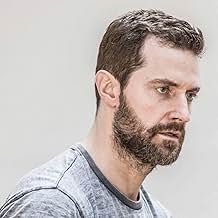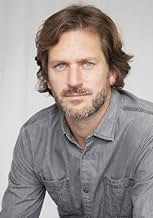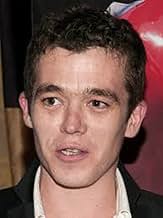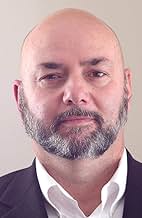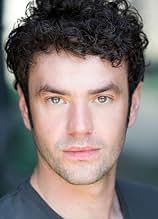In 13th-century Ireland, a group of monks must escort a sacred relic across a landscape fraught with peril.In 13th-century Ireland, a group of monks must escort a sacred relic across a landscape fraught with peril.In 13th-century Ireland, a group of monks must escort a sacred relic across a landscape fraught with peril.
- Awards
- 1 win & 3 nominations total
Akilas Karazisis
- The Killer
- (as Akillas Karazisis)
Gaëtan Wenders
- Fournier
- (as Gaetan Wenders)
- Director
- Writer
- All cast & crew
- Production, box office & more at IMDbPro
Featured reviews
This is very good. far more realistic than Hollywood might produce. it's interesting, much dogma was born of superstition, identifications that without science, were attributed to whatever godly (natural) forces our people believed in at the time. However, belief is a force unto itself and it does serve to manipulate circumstance. that is in here too. well told
I've gone for this movie with no expectations based on its rating ,, but I was really surprised .. This movie is really Powerful that after its end it would make you think for a while about your convictions or the principles of your beliefs . * maybe not going wrong with them but just questioning *
It discusses things not about religion but particularly the way of Religious speech and people who may control the message of religions in general ( Not Christianity in particular ) and how politics also may affect how things work ..
The acting is very good especially that of Jon Bernthal ( The Mute ) .. The music is well played as well as the picture ,, Great Atmosphere of that period of time ( 13th century ) with bloody violent action scenes which were really well performed
This is my first movie of the director Brendan Muldowney and I think it won't be the last .. Great Job
Overall I liked nearly everything about the movie . If you're interested in that period of time and historical movies , Just go for it ..
It discusses things not about religion but particularly the way of Religious speech and people who may control the message of religions in general ( Not Christianity in particular ) and how politics also may affect how things work ..
The acting is very good especially that of Jon Bernthal ( The Mute ) .. The music is well played as well as the picture ,, Great Atmosphere of that period of time ( 13th century ) with bloody violent action scenes which were really well performed
This is my first movie of the director Brendan Muldowney and I think it won't be the last .. Great Job
Overall I liked nearly everything about the movie . If you're interested in that period of time and historical movies , Just go for it ..
This strong, atmospheric, and beautifully-made little film did not disappoint based on reviews that either put it in the trash for "gratuitous violence" or gave it a firm pat on the head for a good attempt.
I see the value in the latter assessment - working on a budget, this film does a lot with what it has, providing hauntingly beautiful vistas of an ancient Ireland and making its story stretch beyond its small shooting framework. The actors, too, make so much of the script they've been given, with great performances throughout. Although this does lead me onto the main drawback of the film: the characters are largely undeveloped, especially that of Diarmuid - who is the protagonist no less - and his Brothers. We can see that he cares about them a lot - after all, "the monastery is all he's ever known" - but more development would have been crucial to making me really care about whether they lived or died, failed or succeeded. The most interesting characters for me were Geraldus and the Mute, "grey" characters whose backstories are hinted at if never fully disclosed, and with sublime subtlety in the case of Bernthal's character. The characters we do get to truly see are rewarding, albeit darkly, and were one of the film's greatest triumphs - it just would have been great to see the same treatment given to the lead protagonist and primary villain.
In the other camp, I don't think the story could have worked without the levels of violence, savagery, and loss that we see, which the viewer must witness with the same unblinking acceptance that the characters do. In this, there is a hidden depth to Pilgrimage, a story about Ireland, the land where "there was never peace". One review focused around the particular Irishness of the film rang true in some places - that the colour shown here is multiple shades of grey, and little green - if not in others. This is not a deconstruction of the "Irish" mythos, but it does touch, tenderly and reverentially, upon the idea of an unattainable relic: to know peace, both within and without, a dream not limited to this country but echoed in Jerusalem and beyond. Though it does not present its findings in a wholly satisfying parcel, the film did provoke thought about where that quest for peace could lead us next - to what bloody ends or watery graves? To what loss and to what triumphs?
"Where to now?"
I see the value in the latter assessment - working on a budget, this film does a lot with what it has, providing hauntingly beautiful vistas of an ancient Ireland and making its story stretch beyond its small shooting framework. The actors, too, make so much of the script they've been given, with great performances throughout. Although this does lead me onto the main drawback of the film: the characters are largely undeveloped, especially that of Diarmuid - who is the protagonist no less - and his Brothers. We can see that he cares about them a lot - after all, "the monastery is all he's ever known" - but more development would have been crucial to making me really care about whether they lived or died, failed or succeeded. The most interesting characters for me were Geraldus and the Mute, "grey" characters whose backstories are hinted at if never fully disclosed, and with sublime subtlety in the case of Bernthal's character. The characters we do get to truly see are rewarding, albeit darkly, and were one of the film's greatest triumphs - it just would have been great to see the same treatment given to the lead protagonist and primary villain.
In the other camp, I don't think the story could have worked without the levels of violence, savagery, and loss that we see, which the viewer must witness with the same unblinking acceptance that the characters do. In this, there is a hidden depth to Pilgrimage, a story about Ireland, the land where "there was never peace". One review focused around the particular Irishness of the film rang true in some places - that the colour shown here is multiple shades of grey, and little green - if not in others. This is not a deconstruction of the "Irish" mythos, but it does touch, tenderly and reverentially, upon the idea of an unattainable relic: to know peace, both within and without, a dream not limited to this country but echoed in Jerusalem and beyond. Though it does not present its findings in a wholly satisfying parcel, the film did provoke thought about where that quest for peace could lead us next - to what bloody ends or watery graves? To what loss and to what triumphs?
"Where to now?"
Out of the creeping faerie mist of a dark age comes an intensely suspenseful tale about why we choose our allegiances. This is the heart of the story - our reasons make no sense.
The drama revolves around a lump of rock. That any other lump could replace it at any time and no-one would notice is openly stated in the dialogue. It's the stark question woven through the plot - is faith taken on faith alone really worth fighting for?
It's a tense film, beautifully written and exquisitely acted. Each viewer decides what the film's about - it doesn't explain itself, it falls silent. Everyone will see something different. Some might conclude we're all compelled towards war whether we like it or not. Some might decide we're all in league with the Devil whether we know it or not. Some might believe we're all still lost in the creeping faerie mist clutching for something to save us.
Some reviewers didn't rate it highly as an action thriller but it's not a superficial movie and maybe doesn't fit into that genre. There's far more being shown in the subtext and the themes than being told in the action. As for the excessive violence, I felt it merely conveyed the grim reality of melee combat. After all, hidden in the word 'Pilgrimage' is the word 'grim'.
It's a mark of a brilliant film when after seeing it once you must see it again. On the second viewing, it bit me deeper on the neck and made me more its thrall.
For me, the main highlight was Jon Bernthal's acting. It was haunting. He played a voiceless man who served the monks as the lowliest of their group and I fell in love with his tragic integrity. He reminded me of another tormented anti-hero of contemporary myth - Angel from 'Buffy The Vampire Slayer': the vampire cursed with a soul, plagued by a weight of remorse for a hellish past. Both crave absolution and will do anything to receive it.
I loved 'Pilgrimage'. It was a strangely beguiling hybrid of superstitious medievalism clashing with an ancient landscape alive with pre-existing belief. And the ending was satisfyingly unsatisfying - like all good fairy tales are.
The drama revolves around a lump of rock. That any other lump could replace it at any time and no-one would notice is openly stated in the dialogue. It's the stark question woven through the plot - is faith taken on faith alone really worth fighting for?
It's a tense film, beautifully written and exquisitely acted. Each viewer decides what the film's about - it doesn't explain itself, it falls silent. Everyone will see something different. Some might conclude we're all compelled towards war whether we like it or not. Some might decide we're all in league with the Devil whether we know it or not. Some might believe we're all still lost in the creeping faerie mist clutching for something to save us.
Some reviewers didn't rate it highly as an action thriller but it's not a superficial movie and maybe doesn't fit into that genre. There's far more being shown in the subtext and the themes than being told in the action. As for the excessive violence, I felt it merely conveyed the grim reality of melee combat. After all, hidden in the word 'Pilgrimage' is the word 'grim'.
It's a mark of a brilliant film when after seeing it once you must see it again. On the second viewing, it bit me deeper on the neck and made me more its thrall.
For me, the main highlight was Jon Bernthal's acting. It was haunting. He played a voiceless man who served the monks as the lowliest of their group and I fell in love with his tragic integrity. He reminded me of another tormented anti-hero of contemporary myth - Angel from 'Buffy The Vampire Slayer': the vampire cursed with a soul, plagued by a weight of remorse for a hellish past. Both crave absolution and will do anything to receive it.
I loved 'Pilgrimage'. It was a strangely beguiling hybrid of superstitious medievalism clashing with an ancient landscape alive with pre-existing belief. And the ending was satisfyingly unsatisfying - like all good fairy tales are.
Yes this film is bloody. For some the scenes might even be shocking, but I really enjoyed this film. Acting was good, the suspense build up was very good. And at no point did it seem the violence was unnecessary. If you enjoy historical type films and don't mind seeing a head bashed in close up, you will enjoy this.
Did you know
- TriviaTo prepare for his role, Jon Bernthal spent the first few weeks of shooting completely silent, even when he's not on set.
- GoofsAll entries contain spoilers
- How long is Pilgrimage?Powered by Alexa
Details
Box office
- Budget
- €4,749,500 (estimated)
- Gross worldwide
- $23,689
- Runtime
- 1h 36m(96 min)
- Color
- Sound mix
- Aspect ratio
- 2.35 : 1
Contribute to this page
Suggest an edit or add missing content



